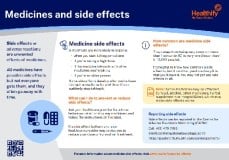You can now add Healthify as a preferred source on Google. Click here to see us when you search Google.
Meclozine
Sounds like ‘mek-loh-zeen’
Key points about meclozine
- Meclozine is used to treat and prevent nausea or vomiting caused by motion sickness.
- Meclozine is also called Sea Legs®, Travel Relief® or Travel Ease®.
- Find out how to take it safely and possible side effects.

Meclozine is used for nausea (feeling sick) or vomiting (being sick) caused by motion sickness (whether travelling by car, plane, boat or bus).
It works by blocking the chemical histamine, in the brain, that is known to trigger nausea and vomiting.
Meclozine is also called Sea Legs®, Travel Relief® or Travel Ease®.
In Aotearoa New Zealand, meclozine is available as tablets in 2 strengths (12.5 mg or 25 mg) that can be bought over the counter from a pharmacy.
- The usual dose of meclozine for adults is 25 mg to 50 mg once a day. Check the strength of the meclozine tablets you have. If you're not sure how many tablets to take, ask your healthcare provider or pharmacist.
- To prevent motion sickness, meclozine is best taken the night before you travel or 1 hour before travel.
- Its effect lasts for up to 24 hours. If you’re still feeling sick, don’t take more doses. Wait 24 hours before you take another dose.
- You can wait to take meclozine when the feeling of sickness starts, but it doesn't work as well.
- Meclozine can be used by children 6 years and over. Ask your healthcare provider or pharmacist about how much to give your child.
- Take meclozine with a glass of water. Some tablets can be chewed – check the packaging.
- Food: You can take meclozine with or without food.
- Are you a child?
- Do you have problems with your liver?
- Have you ever had problems with your bowel, like bowel obstruction?
- Do you have prostate problems or problems passing urine (wee)?
- Do you have epilepsy?
- Do you have glaucoma (increased pressure in your eye)?
- Are you pregnant or breastfeeding?
- Are you taking or using any other medicines? This includes any medicines being taken which are available to buy without a prescription, as well as herbal and complementary medicines. Meclozine may interact with some medicines and herbal supplements, so check with your healthcare provider or pharmacist before taking meclozine.
If any of these apply to you, it’s important that you tell your healthcare provider or pharmacist before you start meclozine. Sometimes a medicine isn’t suitable for a person with certain conditions, or it can only be used with extra care.
Like all medicines, meclozine can cause side effects, although not everyone gets them. If you're concerned about any symptoms you think might be related to your medicine, talk to your healthcare provider. The following information offers some guidance but doesn't include all possible side effects.
Drowsiness and dizziness
Meclozine can make some people feel drowsy, sleepy or tired. It can also make you feel dizzy and can cause blurred vision. Don’t drive or operate machinery while you’re taking meclozine. Don't drink alcohol as it can make these effects worse.
Common side effects
Tell your healthcare provider if these side effects bother you.
- Dry mouth: Try sucking on ice chips or lollies, or drink small sips of water. Read more about dry mouth.
- Dizziness, drowsiness, blurred vision, feeling faint: Don’t drive or operate machinery. Don’t drink alcohol. Take care when getting out of bed so you don’t fall over.
- Constipation: Increase the amount of fibre in your diet by eating lots of fruit, vegetables, brown bread and bran-based breakfast cereals. Drink plenty of water. Read more about constipation.
Tell your healthcare provider immediately or phone Healthline free on 0800 611 116 if these occur
- Difficulty peeing (urine retention).
Phone 111 for an ambulance or go to your nearest accident and emergency (A&E) clinic if these occur
-
Signs of an allergic reaction such as itchy skin, and rash, swollen lips or tongue, problems breathing, like a tight chest or shortness of breath.
Read more about medicines and side effects and reporting a reaction you think might be a side effect.
If you think a child or someone else has taken a medicine that is not for them, call the New Zealand National Poisons Centre(external link) immediately on 0800 764 766 for advice. Read more about what you can do in the event of a poisoning.
The following link has more information on meclozine:
Meclozine(external link) New Zealand Formulary Patient Information
Brochures
Medicines and side effects(external link) Healthify He Puna Waiora, NZ, 2024
5 questions to ask about your medications(external link) Health Quality and Safety Commission, NZ, 2019 English(external link), te reo Māori(external link)
References
- Meclozine(external link) New Zealand Formulary
- Meclozine hydrochloride(external link) New Zealand Formulary for Children
Brochures

Medicines and side effects
Healthify He Puna Waiora, NZ, 2024

Health Quality and Safety Commission, NZ, 2019 English, te reo Māori
Credits: Healthify editorial team. Healthify is brought to you by Health Navigator Charitable Trust.
Reviewed by: Stephanie Yee, Pharmacist, Auckland.
Last reviewed:





